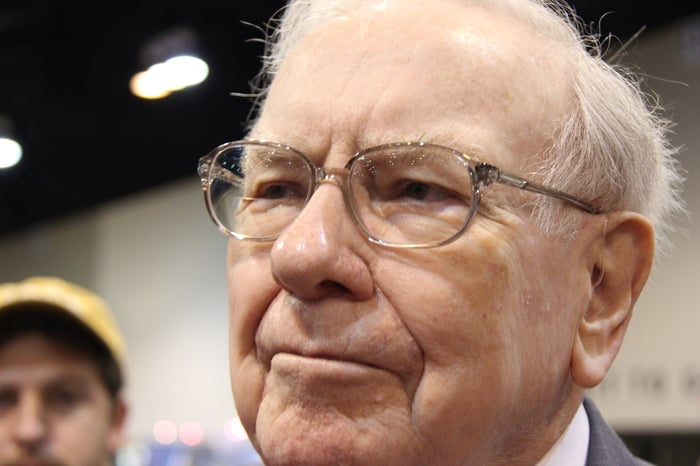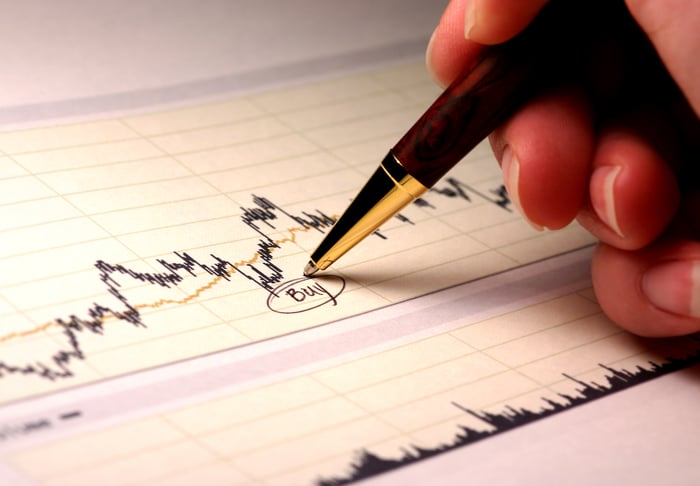|
|
|

|
|||||

|
|
Form 13Fs provide a concise way for investors to track which stocks Wall Street's savviest money managers are buying and selling.
Profit-taking may explain only part of the story behind Warren Buffett's persistent selling of Bank of America stock.
Meanwhile, an industrial stock with recurring revenue streams has clearly piqued the interest of Berkshire Hathaway's billionaire boss.
In just under two months, Berkshire Hathaway's (NYSE: BRK.A)(NYSE: BRK.B) billionaire CEO Warren Buffett will retire from overseeing day-to-day operations and hand the reins over to Greg Abel. It'll be a bittersweet moment for Wall Street and Berkshire's shareholders given that the Oracle of Omaha has overseen a greater than 5,750,000% cumulative return in his company's Class A shares (BRK.A) since taking over in 1965.
Despite Buffett's time at the helm winding down, he hasn't stopped making or overseeing big investment moves at the trillion-dollar company he helped build.
Where to invest $1,000 right now? Our analyst team just revealed what they believe are the 10 best stocks to buy right now. Continue »
No later than 45 calendar days following the end of a quarter, institutional investors with at least $100 million in assets under management are required to file Form 13F with the Securities and Exchange Commission. A 13F paints a clear picture of which stocks Wall Street's savviest money managers have been buying and selling. Arguably no 13F filing is more anticipated than that of Berkshire Hathaway.

Berkshire Hathaway CEO Warren Buffett. Image source: The Motley Fool.
When looking back at Berkshire's last four 13Fs (covering the period from July 1, 2024, to June 30, 2025), clear trends emerge. Specifically, Buffett has been persistently paring down his company's once-mammoth stake in Bank of America (NYSE: BAC), all while piling into a large-cap cyclical stock, which has delivered jaw-dropping returns since its initial public offering (IPO).
As of the midpoint of 2024, Bank of America (commonly known by its shorthand, "BofA") was Berkshire's second-largest holding by market value. The Oracle of Omaha's company held more than 1.03 billion shares of BofA.
There's not a sector of the market Warren Buffett understands better or prefers to invest in more than financials. He astutely recognizes that cyclical businesses (like banks) benefit from the disproportionate nature of economic cycles. Periods of economic growth lasting considerably longer than recessions allow financial institutions to expand their loan portfolios and thrive in unison with the U.S. and global economy over time.
But over the previous four reported quarters, Buffett hasn't been shy about paring down his company's exposure to BofA stock. Over this timeline, 427,584,631 shares have been sold, representing 41% of Berkshire Hathaway's stake in the company, as of the end of June 2024.
It's quite possible this persistent selling activity represents nothing more than Warren Buffett's desire to lock in gains at an advantageous corporate income tax rate. During Berkshire Hathaway's annual meeting in 2024, Berkshire's billionaire boss alluded to the prospect of the peak marginal corporate income tax rate rising in the future as justification for selling down his company's stake in Apple. While Bank of America wasn't mentioned, it represents one of Berkshire's sizable unrealized investment gains.
But profit-taking may only explain part of the reason for selling 41% of Berkshire's BofA stake in 12 months.
Among America's largest money-center banks, Bank of America is the most sensitive to changes in interest rates. When the Federal Reserve aggressively fought back against rapidly rising inflation and increased the federal funds rate by 525 basis points from March 2022 to July 2023, no large bank enjoyed a bigger uptick in net interest income than BofA.
However, the nation's central bank is now decisively in a rate-easing cycle, with another 25-basis-point reduction to the federal funds rate enacted last week. As rates fall, there's the potential for Bank of America's bottom line to be disproportionately hurt, relative to its other large banking peers.
Additionally, Berkshire's boss is a stickler when it comes to stock valuations. When Buffett orchestrated a deal in August 2011 that saw Berkshire Hathaway provide $5 billion in capital to shore up BofA's balance sheet in exchange for $5 billion in BofA preferred stock, Bank of America's common shares were trading at a 68% discount to their book value. As of Oct. 29, BofA stock had pushed to a 39% premium to its book value.
It's no longer the plain-as-day bargain it once was, which may be enticing Warren Buffett to reduce his company's exposure.

Image source: Getty Images.
Admittedly, Bank of America isn't the only stock whose valuation or premium has risen in recent years.
The stock market, as a whole, is in rarified territory. The aptly named Buffett indicator, which divides the aggregate value of all publicly traded stocks by U.S. gross domestic product (GDP), hit an all-time high last week, while the S&P 500's Shiller Price-to-Earnings Ratio is at its second-highest multiple when back-tested 154 years.
Between Oct. 1, 2022, and June 30, 2025, Berkshire's boss has been a net-seller of stocks in all 11 quarters, to the cumulative tune of $177.4 billion.
In spite of this net-selling activity, there's one stock Berkshire's soon-to-be-retiring CEO hasn't been able to stop buying: pool supplies and related equipment distributor Pool Corp. (NASDAQ: POOL). Berkshire's 13Fs detail buying activity for four consecutive quarters:
The principles that have historically enticed the Oracle of Omaha to buy financials also come into play with industrial stocks like Pool. Since the end of World War II, the average U.S. recession has resolved in 10 months, while the typical economic expansion has clocked in at around five years. A cyclical business like Pool Corp., which provides solutions to consumers and professionals maintaining pools and spas, is going to spend more time in the sun than under the proverbial clouds.
Pool Corp. also delivers recurring sales and fairly predictable operating cash flow quarter after quarter. Once a homeowner or business puts in a pool or spa, they're going to need maintenance and repair products for it to stay in good working order.
Furthermore, Pool is thinking out of the box and attempting to bolster its margins by looking beyond traditional retail sales. Its Pool360 platform serves as an online marketplace for its products, as well as a software platform for professional technicians to market their business, optimize scheduling, and automate billing, among other tasks.
Rounding things out, Pool Corp. offers a healthy capital-return program, featuring a steady dose of dividends and share buybacks. Including its dividend, Pool stock has rallied more than 42,400% since its IPO in mid-October 1995.
Though President Donald Trump's tariffs have introduced a level of uncertainty into the U.S. economy that has the potential to weigh on cyclical companies like Pool over the short run, Berkshire's billionaire boss clearly sees value and well-defined competitive advantages in this company.
Before you buy stock in Pool, consider this:
The Motley Fool Stock Advisor analyst team just identified what they believe are the 10 best stocks for investors to buy now… and Pool wasn’t one of them. The 10 stocks that made the cut could produce monster returns in the coming years.
Consider when Netflix made this list on December 17, 2004... if you invested $1,000 at the time of our recommendation, you’d have $603,392!* Or when Nvidia made this list on April 15, 2005... if you invested $1,000 at the time of our recommendation, you’d have $1,241,236!*
Now, it’s worth noting Stock Advisor’s total average return is 1,072% — a market-crushing outperformance compared to 194% for the S&P 500. Don’t miss out on the latest top 10 list, available when you join Stock Advisor.
*Stock Advisor returns as of October 27, 2025
Bank of America is an advertising partner of Motley Fool Money. Sean Williams has positions in Bank of America. The Motley Fool has positions in and recommends Apple and Berkshire Hathaway. The Motley Fool has a disclosure policy.
| 52 min | |
| 3 hours | |
| 9 hours | |
| 10 hours |
Stock Market Week: Reaction To Iran, Berkshire Earnings, Apple Event
BRK-B
Investor's Business Daily
|
| 10 hours |
Stock Market Week: Reaction To Iran, Berkshire Earnings, Apple Event
BRK-A
Investor's Business Daily
|
| 11 hours | |
| 12 hours | |
| 12 hours | |
| 13 hours | |
| 14 hours | |
| 14 hours |
Warren Buffett's successor Greg Abel publishes his first letter to Berkshire Hathaway shareholders
BRK-A
Associated Press Finance
|
| 14 hours | |
| 21 hours | |
| Feb-27 | |
| Feb-27 |
Join thousands of traders who make more informed decisions with our premium features. Real-time quotes, advanced visualizations, backtesting, and much more.
Learn more about FINVIZ*Elite